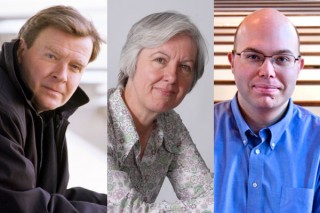Title

Pieces by Magnus Lindberg (left), Judith Weir, and Charles Cooman will be performed by N.J.E. at its season opener, on September 29. The Lindberg and Weir works were co-commissioned by the Royal Philharmonic Society and the Britten Pears Foundation.
(Photo by Hanya Chlala (Lindberg); Chris Christodoulou (Weir); Colby Cooman (Cooman))Following two successful Summergarden performances, the New Juilliard Ensemble’s 21st season opens on September 29 with a program whose roots—seemingly ironically for a new-music ensemble—stretch back 200 years, to the founding of London’s Philharmonic Society. In 1813 the new entity, which would later be renamed the Royal Philharmonic Society (R.P.S.), created the world’s first professional symphonic-sized orchestra. Its flowering was closely linked to the evolution of large-scale concerts and big orchestrations as well as the challenge of attracting audiences to new music. Above all, it was central to the “cult” dubbed classical music that emerged in the first half of the 19th century. The society began commissioning composers, and a few years after its founding, asked Ludwig van Beethoven to write what would become his Ninth Symphony. He delivered it seven years later, in 1824, and the society premiered it the following year. The Juilliard connection to all of this began in the 1970s, when I was researching a book about the R.P.S.
.
Body
Fast-forward a few decades to 2011, when I visited the R.P.S. to discuss that book project, which had kept me busy until the mid-1980s, when I was sidetracked into writing a biography of Henry Cowell. Having nearly completed the Cowell book, and feeling the temptation to return to the R.P.S., I thought it prudent to see if anyone had written “my” book in the intervening decades. No one had! As an outgrowth of my conversations then and later with the R.P.S. executive director, Rosemary Johnson, and projects coordinator, Tom Hutchinson, N.J.E. was asked to give the U.S. premieres of two bicentennial commissions that the R.P.S. had co-commissioned with the Britten Pears Foundation in celebration of the concurrent Benjamin Britten centennial. The composers would be Judith Weir (Scotland) and Magnus Lindberg (Finland). Since I know both composers and admire their music, I replied that as long as the instrumentation was right and the date could be arranged, I was interested and confident that the Juilliard administration would be as well.
A date available to N.J.E., September 29, fit perfectly into the New York Philharmonic’s New York celebrations. As usual, however, nothing remains simple for very long. I had been told that both pieces would be scored for the “single everything” sinfonietta scoring. I shortly learned, however, that Weir was writing for string orchestra, an uncharacteristic N.J.E. instrumentation! Fortunately, Juilliard’s administration agreed that the event was very important and that we should be able to get enough excellent string players to perform because the concert is so early in the term.
Meanwhile, the R.P.S., Lindberg’s publisher, and I all had been assured that Lindberg was writing for sinfonietta in his commission. But when Lindberg delivered his piece, we discovered that he had used double winds and brass, though only five strings. Although I was relieved by the small string group, I wondered how it would mix with so many winds and brass. Happily, I found myself in a position to be at the Aldeburgh Festival for the premiere, and was delighted to hear Lindberg’s small string group surviving the competition of the winds, brass, percussion, and two pianos, even in the extremely boomy acoustics of the concert hall. (The previous night, I was very fortunate to see Britten’s Peter Grimes in an amazing performance right on the Aldeburgh beach, the part of England where the original story unfolded.) Lindberg named his piece Red House, after the Aldeburgh estate where Britten lived for decades, and joined it with two earlier works to form a three-movement piece he named Aldeburgh Trilogy.
The Aldeburgh Trilogy and Weir’s I Give You the End of a Golden String comprise half of N.J.E.’s September 29 concert. The rest of the program includes the world premiere of Flax-Golden Tales, for storyteller and chamber orchestra, which was written for us by the Boston composer Carson Cooman to texts by Erin Morgenstern. The utterly charming stories will be told by Katherine Wood, a 2013 drama graduate. The fourth piece is Table Manners, by the Dutch composer and virtuoso jazz pianist Guus Janssen. An amusing percussion concerto, it lacks the usual headaches of a big setup because the soloist—master’s student Andrew Funcheon—primarily plays a table. Janssen told me the piece was inspired by his family’s requests that he kindly refrain from tapping on the dining table at meals.
New Juilliard Ensemble. Peter Jay Sharp Theater; Sept. 29 at 5 p.m. There will be a preconcert discussion with Sachs and the Royal Philharmonic’s Johnson and Hutchinson at 4 p.m.




